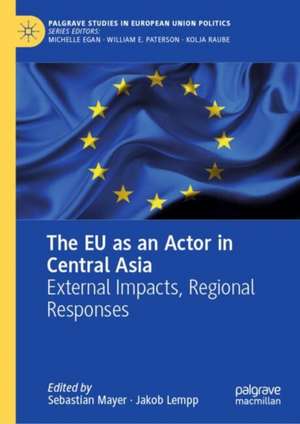The EU as an Actor in Central Asia: External Impacts, Regional Responses: Palgrave Studies in European Union Politics
Editat de Sebastian Mayer, Jakob Lemppen Limba Engleză Hardback – oct 2024
Din seria Palgrave Studies in European Union Politics
- 20%
 Preț: 691.32 lei
Preț: 691.32 lei - 20%
 Preț: 691.52 lei
Preț: 691.52 lei - 9%
 Preț: 798.62 lei
Preț: 798.62 lei - 20%
 Preț: 755.99 lei
Preț: 755.99 lei -
 Preț: 282.28 lei
Preț: 282.28 lei - 18%
 Preț: 889.75 lei
Preț: 889.75 lei - 20%
 Preț: 690.39 lei
Preț: 690.39 lei -
 Preț: 243.89 lei
Preț: 243.89 lei -
 Preț: 388.72 lei
Preț: 388.72 lei -
 Preț: 388.72 lei
Preț: 388.72 lei -
 Preț: 393.52 lei
Preț: 393.52 lei -
 Preț: 392.60 lei
Preț: 392.60 lei -
 Preț: 390.25 lei
Preț: 390.25 lei -
 Preț: 390.63 lei
Preț: 390.63 lei -
 Preț: 389.70 lei
Preț: 389.70 lei -
 Preț: 387.96 lei
Preț: 387.96 lei -
 Preț: 391.61 lei
Preț: 391.61 lei -
 Preț: 391.61 lei
Preț: 391.61 lei -
 Preț: 392.60 lei
Preț: 392.60 lei -
 Preț: 386.81 lei
Preț: 386.81 lei -
 Preț: 390.63 lei
Preț: 390.63 lei -
 Preț: 386.00 lei
Preț: 386.00 lei -
 Preț: 392.60 lei
Preț: 392.60 lei -
 Preț: 388.72 lei
Preț: 388.72 lei - 15%
 Preț: 645.79 lei
Preț: 645.79 lei -
 Preț: 391.61 lei
Preț: 391.61 lei - 15%
 Preț: 645.47 lei
Preț: 645.47 lei -
 Preț: 392.21 lei
Preț: 392.21 lei -
 Preț: 386.81 lei
Preț: 386.81 lei -
 Preț: 390.63 lei
Preț: 390.63 lei -
 Preț: 390.63 lei
Preț: 390.63 lei -
 Preț: 387.75 lei
Preț: 387.75 lei -
 Preț: 389.88 lei
Preț: 389.88 lei -
 Preț: 388.52 lei
Preț: 388.52 lei -
 Preț: 391.61 lei
Preț: 391.61 lei -
 Preț: 400.26 lei
Preț: 400.26 lei -
 Preț: 387.75 lei
Preț: 387.75 lei -
 Preț: 386.81 lei
Preț: 386.81 lei -
 Preț: 388.72 lei
Preț: 388.72 lei -
 Preț: 389.88 lei
Preț: 389.88 lei -
 Preț: 391.61 lei
Preț: 391.61 lei -
 Preț: 389.70 lei
Preț: 389.70 lei -
 Preț: 386.81 lei
Preț: 386.81 lei -
 Preț: 389.88 lei
Preț: 389.88 lei -
 Preț: 388.72 lei
Preț: 388.72 lei - 15%
 Preț: 643.48 lei
Preț: 643.48 lei - 15%
 Preț: 582.63 lei
Preț: 582.63 lei -
 Preț: 398.35 lei
Preț: 398.35 lei - 15%
 Preț: 644.18 lei
Preț: 644.18 lei
Preț: 949.55 lei
Preț vechi: 1157.98 lei
-18% Nou
Puncte Express: 1424
Preț estimativ în valută:
181.70€ • 190.19$ • 151.23£
181.70€ • 190.19$ • 151.23£
Carte tipărită la comandă
Livrare economică 31 martie-14 aprilie
Preluare comenzi: 021 569.72.76
Specificații
ISBN-13: 9783031513534
ISBN-10: 3031513533
Ilustrații: X, 360 p. 25 illus.
Dimensiuni: 148 x 210 mm
Greutate: 0.56 kg
Ediția:2024
Editura: Springer International Publishing
Colecția Palgrave Macmillan
Seria Palgrave Studies in European Union Politics
Locul publicării:Cham, Switzerland
ISBN-10: 3031513533
Ilustrații: X, 360 p. 25 illus.
Dimensiuni: 148 x 210 mm
Greutate: 0.56 kg
Ediția:2024
Editura: Springer International Publishing
Colecția Palgrave Macmillan
Seria Palgrave Studies in European Union Politics
Locul publicării:Cham, Switzerland
Cuprins
1. Introduction: The European Union and Central Asia.- 2. Key turning points in EU-Central Asia Relations.- Part I. EU External Action and Regional Response.- 3. European Union Action towards Central Asia.- 4. EU Member States and Central Asia.- 5. Negotiating and Implementing the (E)PCAs.- 6. The EU and Central Asia: Mutual Perceptions.- Part II. Action-Response across Issue Areas.- 7. Economic Development and Trade.- 8. Provision of Security.- 9. Democratization and Human Rights.- 10. Environmental Affairs.- 11. Education.- 12. Conclusions.
Notă biografică
Sebastian Mayer is DAAD Associate Professor of International Relations at the OSCE Academy and Associate Fellow at the American University of Central Asia in Bishkek, Kyrgyzstan.
Jakob Lempp is Full Professor of Political Science with a focus on International Relations at Rhine-Waal University of Applied Sciences in Kleve, Germany.
Jakob Lempp is Full Professor of Political Science with a focus on International Relations at Rhine-Waal University of Applied Sciences in Kleve, Germany.
Textul de pe ultima copertă
"The European Union has matured as an actor in Central Asia but research has not followed suit. This is changing with this volume. Longtime Central Asia watchers with insights into EU policies offer a tour through the EU kitchen of foreign policymaking and discuss the Central Asian reaction to Brussels’ menu."
–Jos Boonstra, Senior Researcher and Coordinator of the Europe-Central Asia Monitoring (EUCAM) initiative at the Centre for European Security Studies in Groningen, The Netherlands.
Sebastian Mayer is DAAD Associate Professor of International Relations at the OSCE Academy and Associate Fellow at the American University of Central Asia in Bishkek, Kyrgyzstan.
Jakob Lempp is Full Professor of Political Science with a focus on International Relations at Rhine-Waal University of Applied Sciences in Kleve, Germany.
Caracteristici
Explains the behavior of the European Union (EU) towards Central Asia Considers how the responses of regional and other extra-regional actors have shaped the EU’s conduct Analyzes how successful the EU has been in achieving its stated objectives in this region
